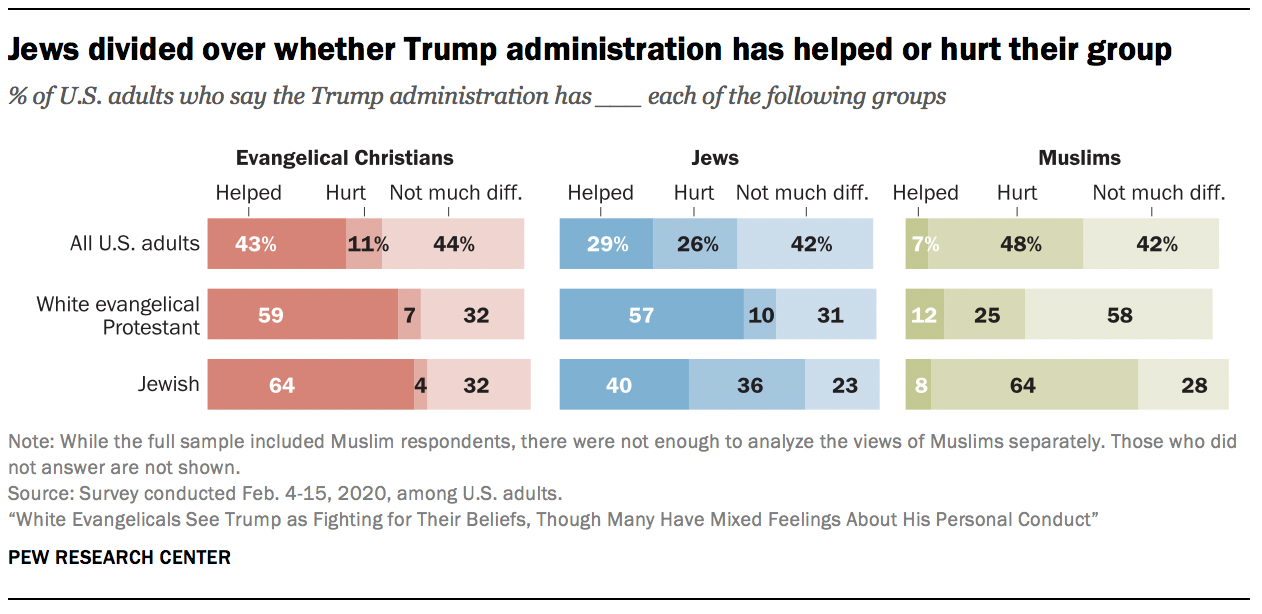
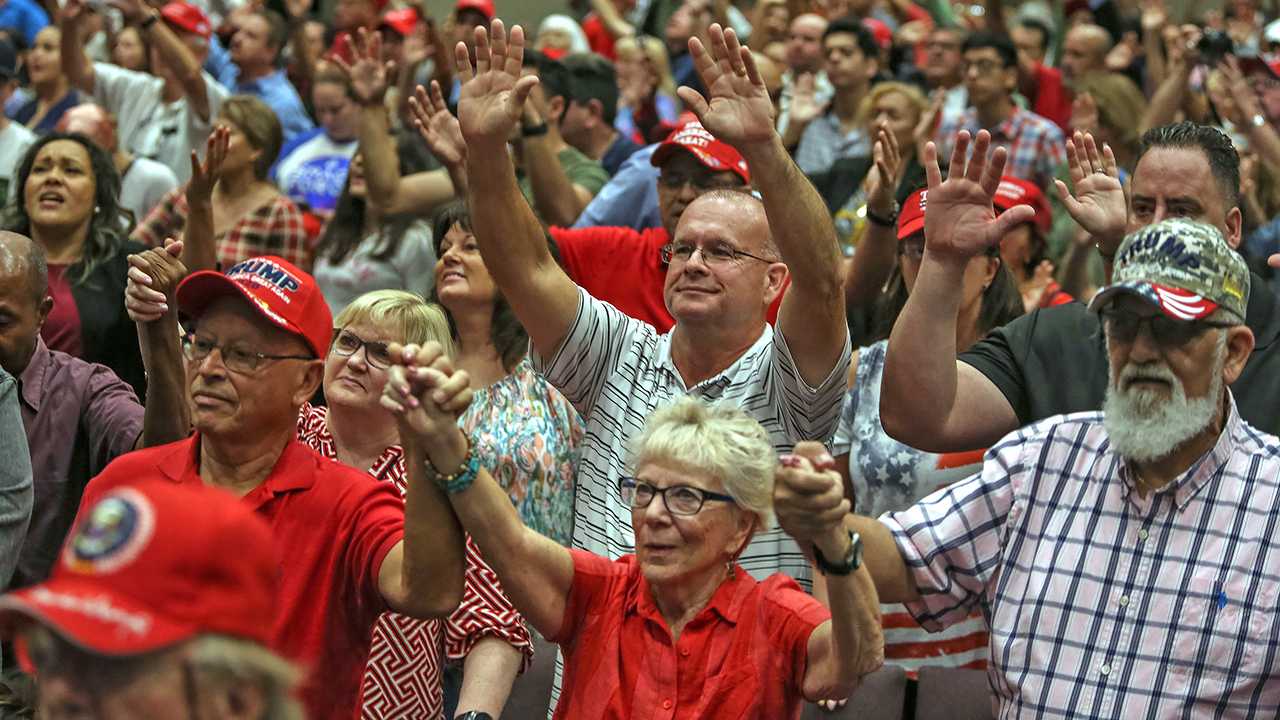
For this report, we surveyed 6,395 U.S. adults from Feb. 4 to 15, 2020. All respondents to the survey are part of Pew Research Center’s American Trends Panel (ATP), an online survey panel that is recruited through national, random sampling of residential addresses. This way nearly all U.S. adults have a chance of selection. The survey is weighted to be representative of the U.S. adult population by gender, race, ethnicity, partisan affiliation, education and other categories. For more, see the ATP’s methodology and the methodology for this report.
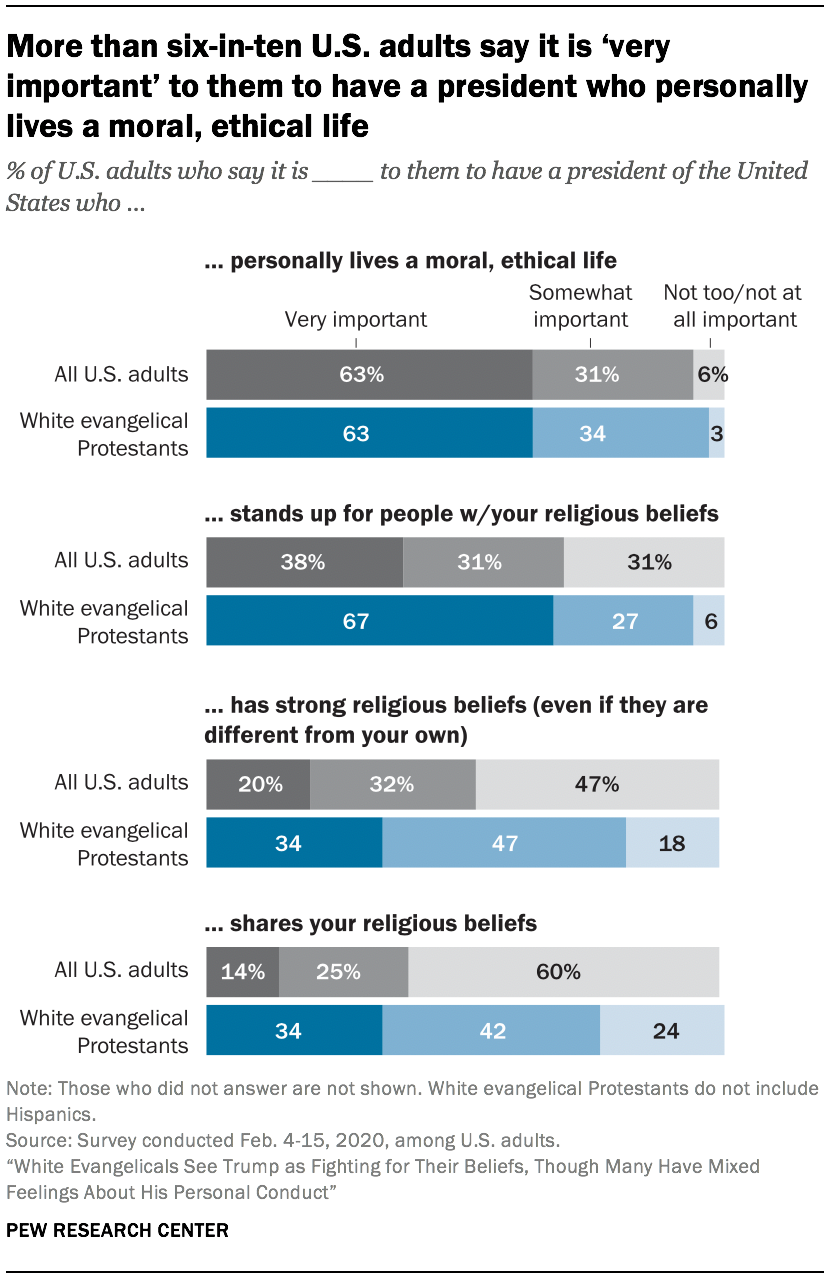
Heading into the 2020 election season, a new Pew Research Center survey delves into the relationship between religion and politics, including perceptions about President Donald Trump among white evangelical Protestants, a key part of his electoral base. It finds that white evangelicals largely see Trump as fighting for their beliefs and advancing their interests, and they feel their side generally has been winning recently on political matters important to them. But when it comes to Trump’s personal qualities and conduct, many express mixed feelings. Even among this strongly supportive constituency, most do not view Trump as a very religious, honest or morally upstanding person (though many white evangelicals say he is somewhat religious, fairly honest or fairly morally upstanding).
More broadly, the survey finds that U.S. adults prize a president who lives a moral and ethical life more than they care about having one who is religious. More than six-in-ten Americans say it is “very important” to them to have a president who personally lives a moral and ethical life. By comparison, just one-in-five say it is very important for a president to have strong religious beliefs, and even fewer respondents think it is vital for the president to share their own religious beliefs.
On the whole, Americans care more about having a president who stands up for their religious beliefs than having one who personally shares those beliefs. Roughly seven-in-ten say it is either very (38%) or somewhat (31%) important to have a president who stands up for people with their religious beliefs.
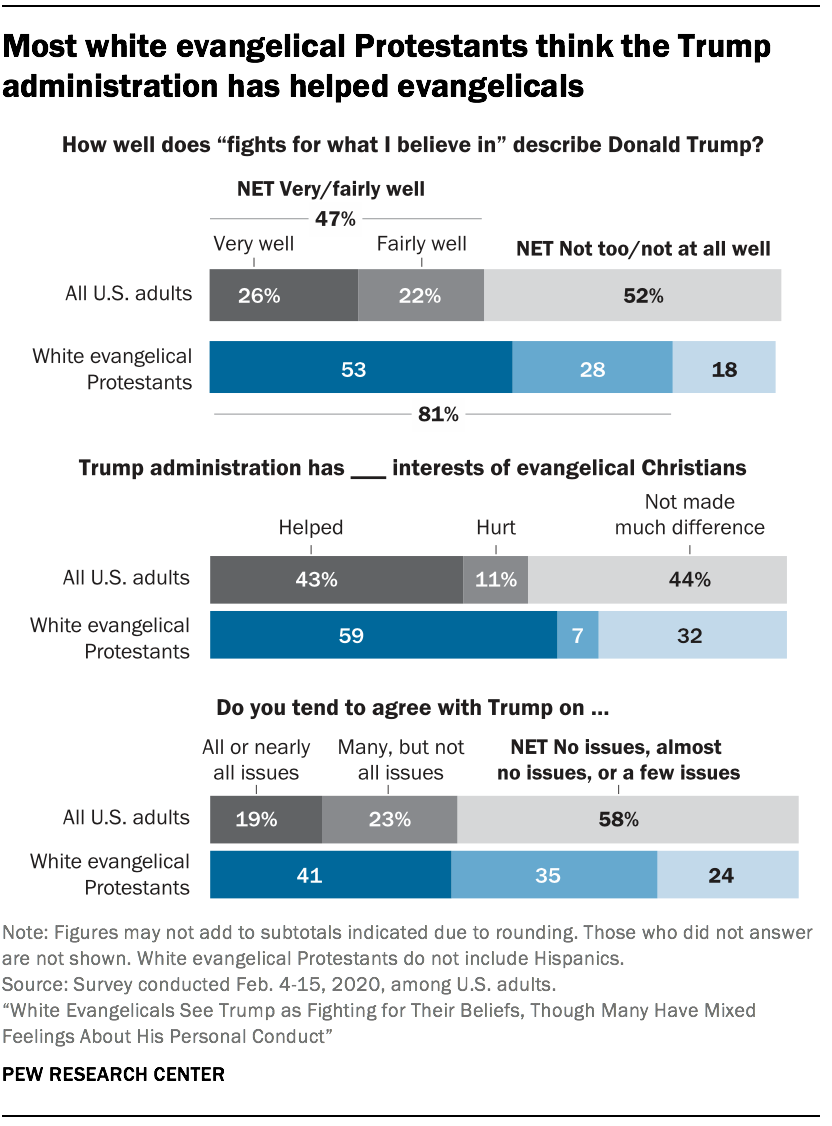
White evangelical Protestants are particularly likely to hold this view. Two-thirds of white evangelicals say it is very important to have a president who stands up for their religious beliefs, about double the share who say it is very important for a president to have strong religious beliefs. And white evangelicals say Trump fits the bill: Fully eight-in-ten white evangelical Protestants say that the phrase “fights for what I believe in” describes Trump “very well” or “fairly well,” including roughly half who say this describes him “very well.”1
Moreover, white evangelical Protestants overwhelmingly feel that the Trump administration has helped (59%) rather than hurt (7%) the interests of evangelical Christians. And three-quarters of white evangelicals say they agree with the president on “many,” “nearly all” or “all” important issues facing the country.
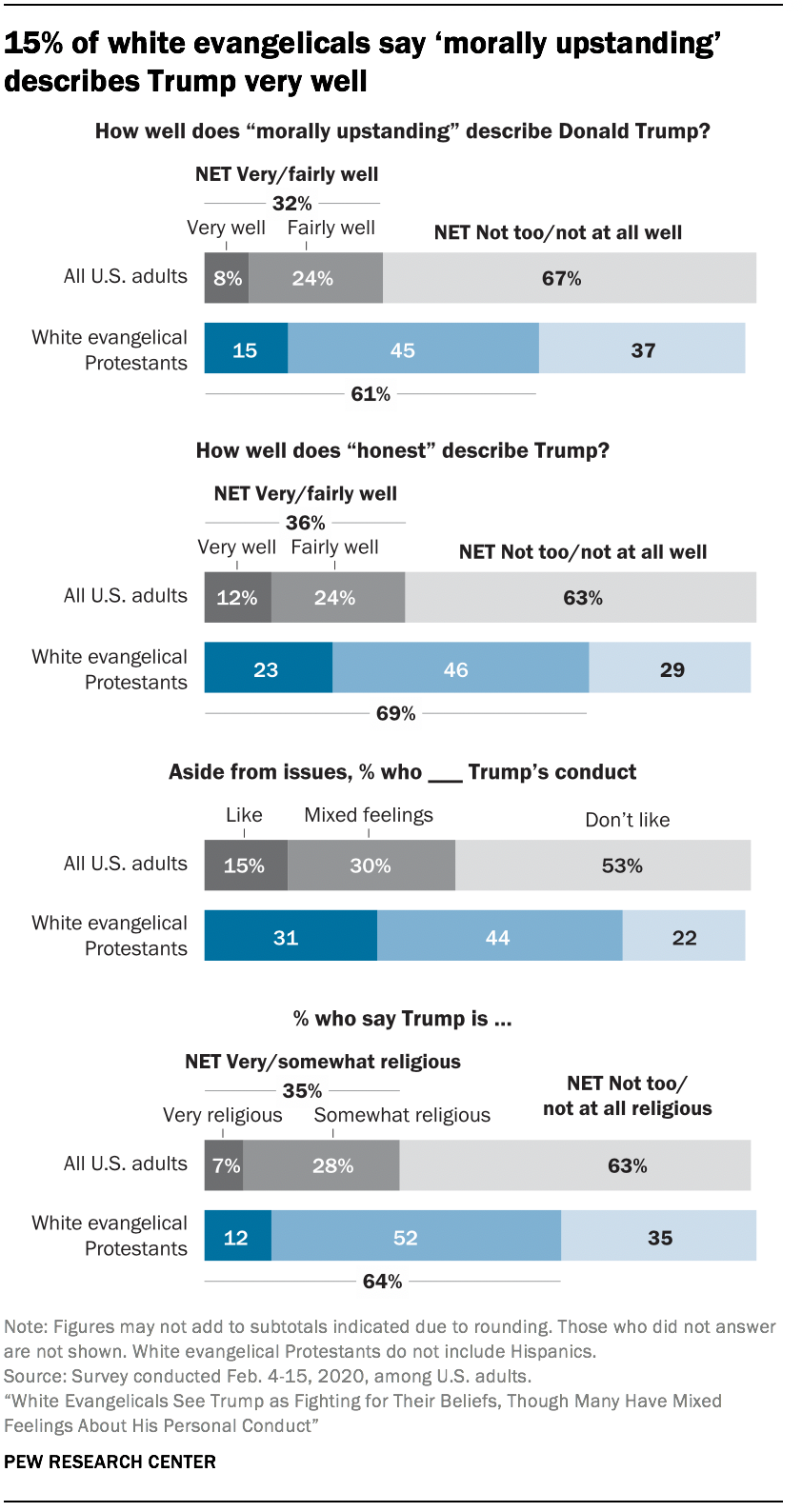
While white evangelical Protestants generally see Trump as standing up for them, they are less convinced that he personally lives a moral and ethical life or conducts himself admirably. Just 15% of white evangelicals say the phrase “morally upstanding” describes Trump very well, and about a quarter say “honest” is a very good descriptor of the president (23%). About one-third of white evangelicals (31%) say they like the way Trump conducts himself as president (aside from his positions on the issues). Fully two-thirds either have “mixed feelings” about his conduct (44%) or say they don’t like it (22%). And only about one-in-eight white evangelicals (12%) think Trump is a very religious person.
Still, even though relatively few white evangelicals say words and phrases like “morally upstanding” and “honest” describe Trump very well, most say these traits describe Trump at least fairly well. And while just one-in-eight white evangelicals say they think Trump is “very” religious, about half (52%) view him as “somewhat” religious.
Compared with white evangelical Protestants, the U.S. public as a whole is far less apt to praise the way Donald Trump conducts himself, or to describe him as even somewhat religious, honest or morally upstanding. For example, just 35% of U.S. adults overall say Trump is either very religious (7%) or somewhat religious (28%); a solid majority of the general public thinks he is “not too” or “not at all” religious (63%). Likewise, majorities say that “honest” and “morally upstanding” describe Trump “not too well” or “not at all well.” And on balance, Americans are much more likely to say they dislike (53%) rather than like (15%) the way Trump conducts himself, while an additional three-in-ten say they have “mixed feelings” about his conduct.
Across all religious groups in this analysis, there is near consensus on one Trump characteristic: Majorities of all groups, including 70% of white evangelicals, say that “self-centered” describes Trump at least fairly well.
These are among the key findings of a new Pew Research Center survey conducted Feb. 4 to 15, 2020, among 6,395 U.S. adults on the Center’s online, nationally representative American Trends Panel. The rest of this Overview looks at these questions and others in greater detail.
Many other white Christians – not just evangelicals – express affinity for Trump
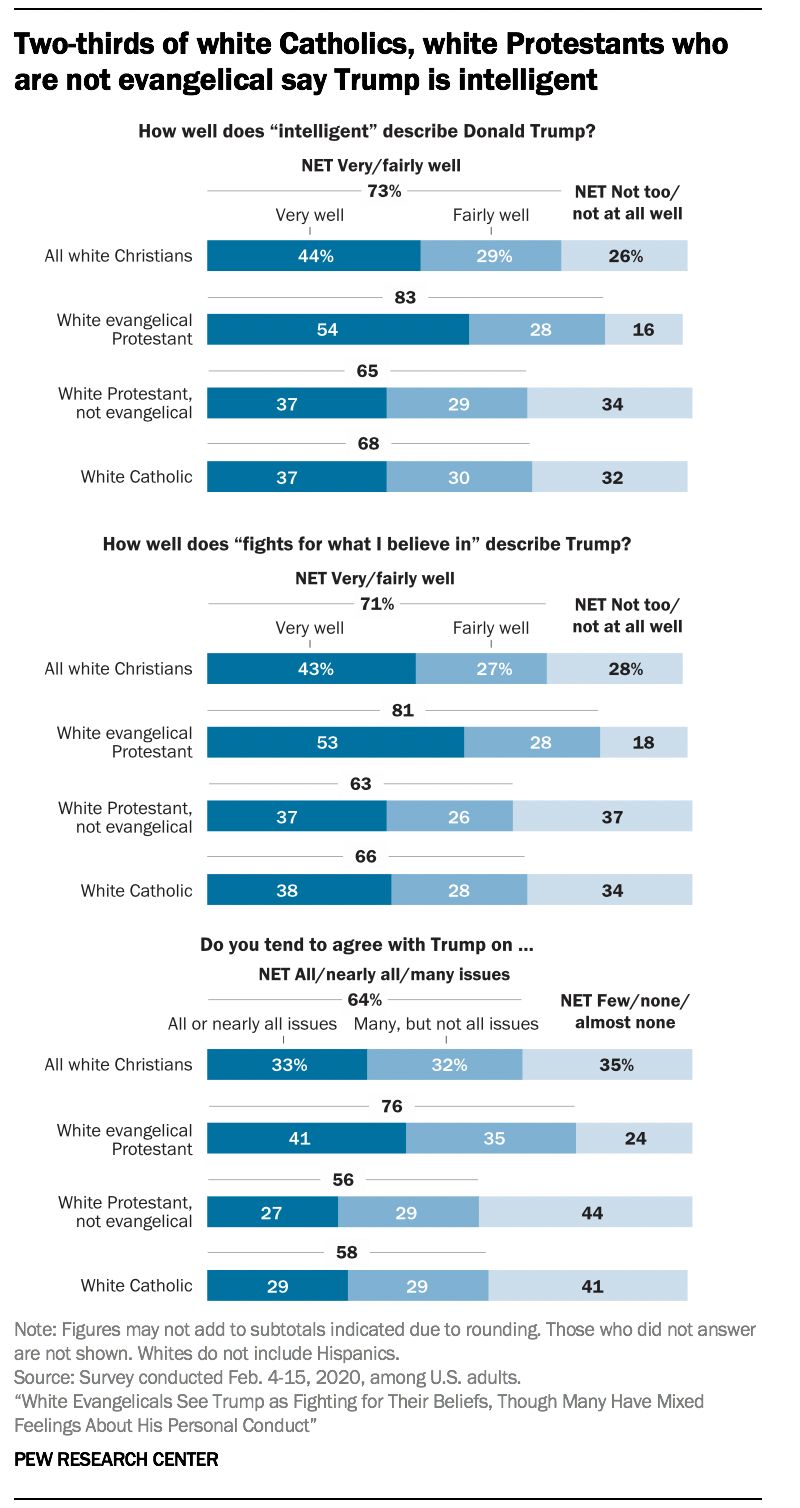
White evangelical Protestants are not alone in their admiration of Trump. Among other groups of white Christians, smaller but still substantial majorities also express agreement with Trump’s policies and associate him with a number of positive traits, such as intelligence.
For example, roughly two-thirds of white Catholics say the phrase “fights for what I believe in” describes Donald Trump very well or fairly well, and 68% of white Catholics say “intelligent” is a fairly or very good descriptor of Trump. Similar shares of white Protestants who are not born-again or evangelical Christians say the same. And more than half of people in both groups say they agree with Trump on many, nearly all or all of the important issues facing the country.
The survey shows, furthermore, that growing numbers in all three of the largest white Christian groups (white evangelical Protestants, white Protestants who are not evangelical and white Catholics) think that their side has been winning recently on the political issues that matter to them.
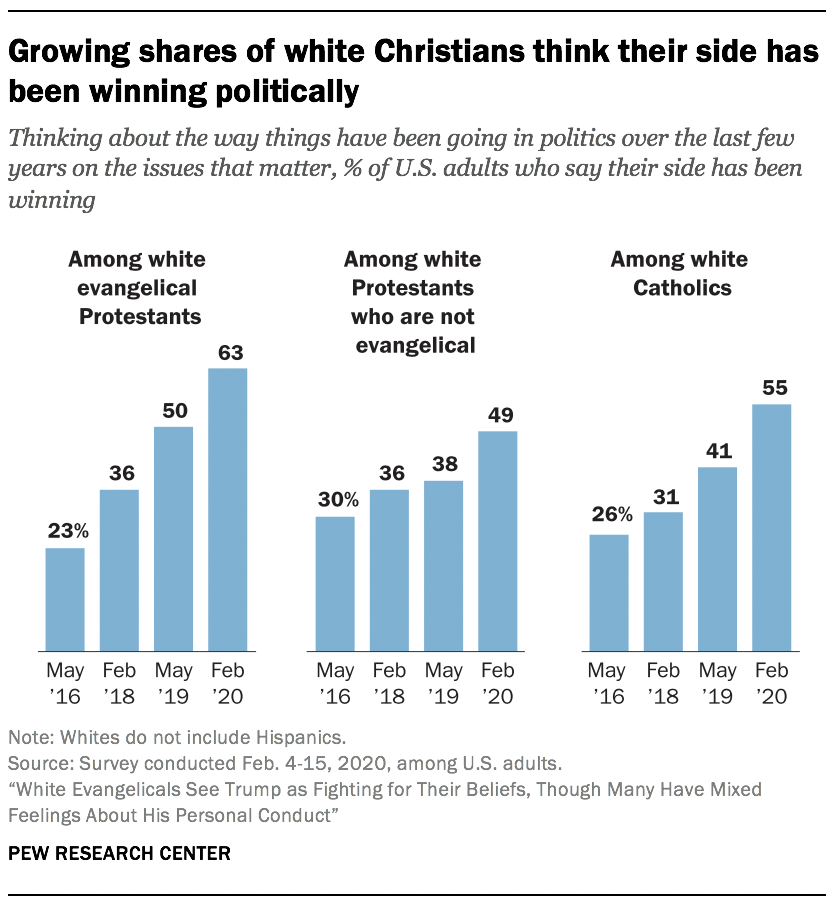
Today, 63% of white evangelical Protestants say their side has been winning lately, nearly triple the share who said this in May 2016, six months before Trump’s election. The share of white non-evangelical Protestants who think their side has been winning politically is up 19 percentage points over the same period, and the share of white Catholics who think their side has been politically victorious of late is 29 points higher today than it was in 2016.
The positive sentiments that white Christians express about Trump and their growing sense that their side has been winning politically largely reflect their political partisanship. In the current survey, 83% of white evangelicals identify with or lean toward the Republican Party, as do 64% of white Protestants who are not evangelical and 65% of white Catholics.
Meanwhile, religious groups whose partisan leanings favor the Democratic Party over the GOP – including Christians who belong to racial and ethnic minority groups, Jews and people with no religious affiliation – are far less admiring of Trump and far more discouraged about how their side has been doing in politics lately.
For example, the share of black Protestants and religious “nones” (those who describe their religious identity as atheist, agnostic or “nothing in particular”) who think their side has been winning lately on the political issues that matter to them is down considerably since Trump’s election. Whereas 43% of black Protestants said their side was generally winning in May 2016, just 26% say this today. And the share of religious “nones” who think their side has been winning in politics is 13 points lower today than it was in 2016.
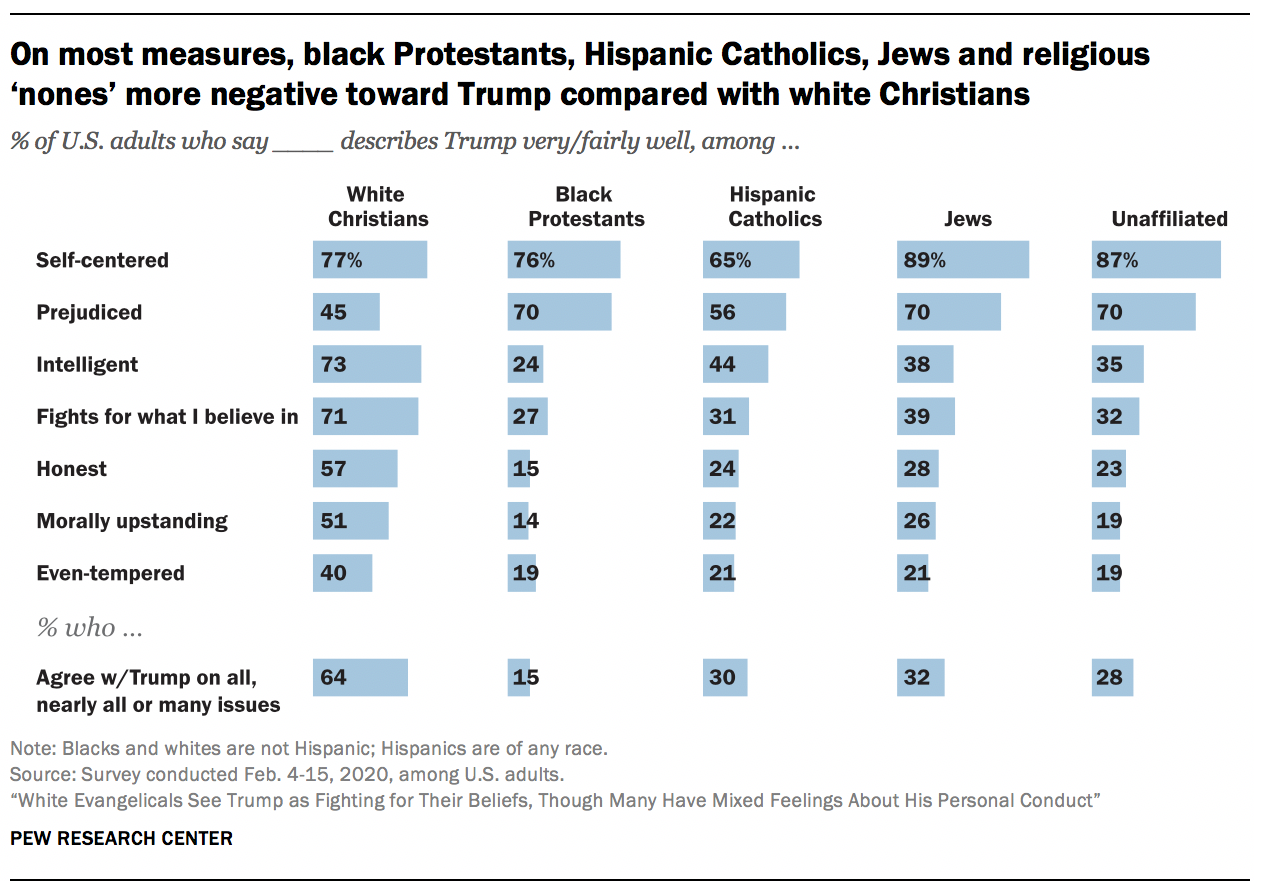
In addition, while seven-in-ten white Christians say “fights for what I believe in” describes Trump at least fairly well, that perception is shared by just four-in-ten or fewer Jews (39%), religious “nones” (32%), Hispanic Catholics (31%) and black Protestants (27%). Three-in-ten or fewer people in these groups say the terms “honest,” “morally upstanding” or “even-tempered” describe Trump at least fairly well. Meanwhile, 56% of Hispanic Catholics and seven-in-ten black Protestants, Jews and religious “nones” say they think Trump is at least fairly “prejudiced.”
Americans tend to see Christianity declining in influence
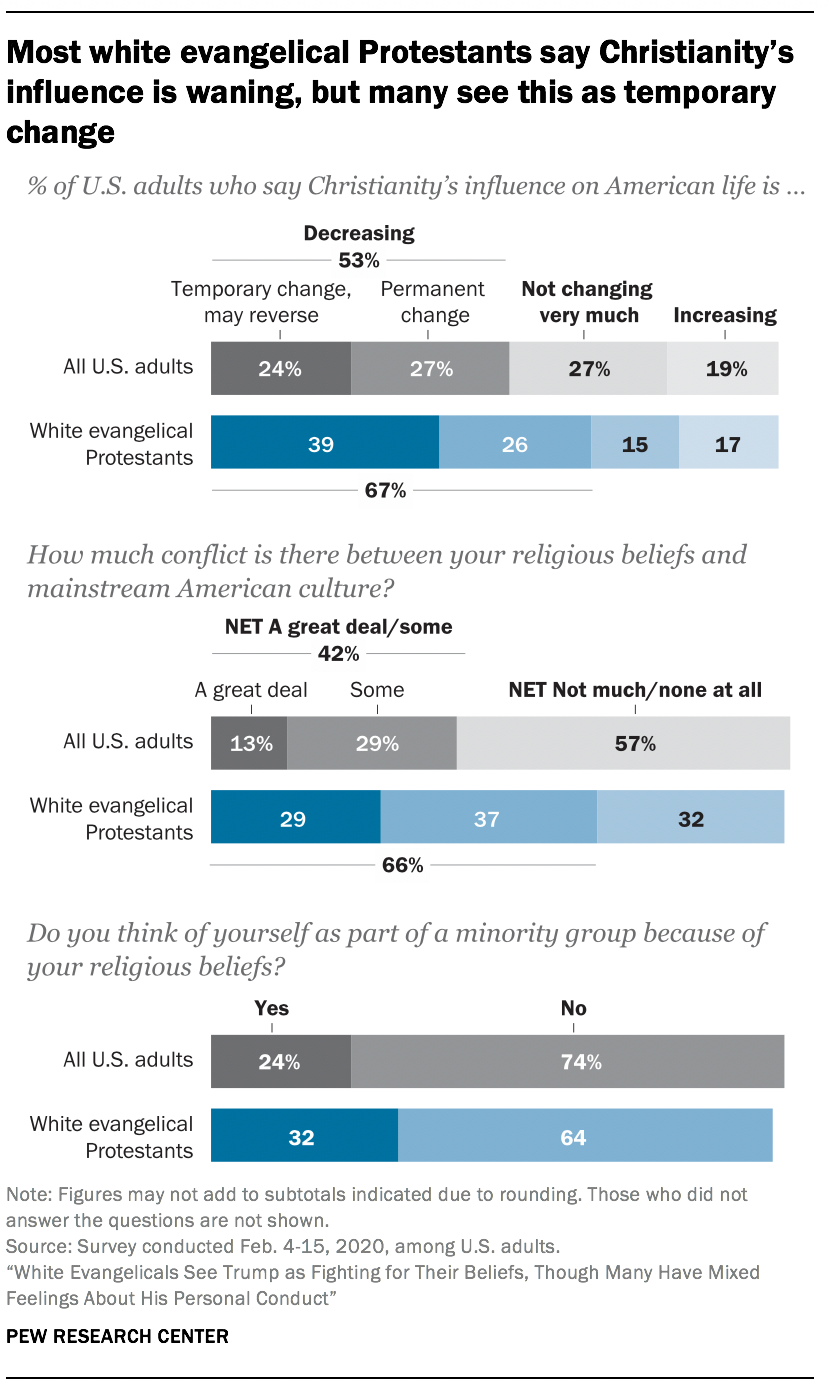
While white Christians – and especially white evangelical Protestants – are feeling good about their political prospects, they are not as positive about the status of Christianity in America today. Fully two-thirds of white evangelicals think Christianity’s influence is decreasing in American life. And a similar share of white evangelical Protestants (66%) say there is at least some conflict between their own religious beliefs and mainstream American culture, including three-in-ten who say there is a “great deal” of conflict.
Why do people feel this way? The survey asked respondents who said Christianity’s influence is declining a series of follow-up questions to gauge several possible causes for this decline, and the most common reasons cited as “major causes” are growth in the number of people in the U.S. who are not religious and misconduct by Christian leaders. But among white evangelical Protestants, the most commonly cited reason for Christianity’s declining influence is “more permissive attitudes about sexual behavior and sexuality in popular culture” (see Chapter 2 for full details).
On the other hand, relatively few white evangelicals say they see themselves as part of a minority group because of their religious beliefs (32%). And while the prevailing view is that Christianity’s influence in American life is waning, many white evangelical Protestants are more optimistic about the future. Indeed, among white evangelicals, there are more people who think Christianity’s declining influence in American life is a temporary change that may reverse itself (39% of all white evangelicals) than there are who think the faith’s reduced influence will be a lasting feature of U.S. society (26%).
Among U.S. adults overall, about half (53%) think that Christianity’s influence is declining, and they are about evenly divided on whether this is a permanent change (27%) or just temporary (24%).
Half of Americans say the Bible should influence U.S. laws
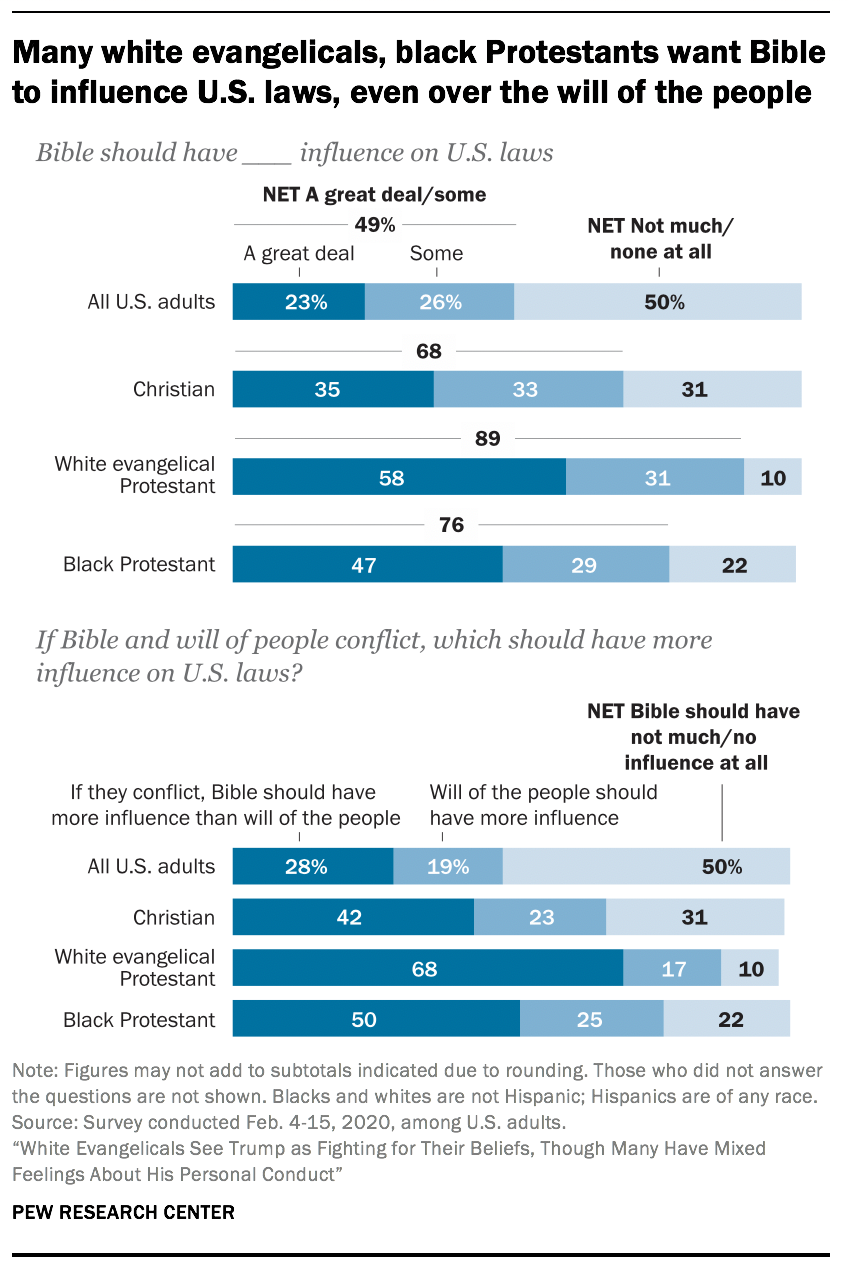
U.S. adults are split over the amount of influence the Bible should have on the laws of the United States. Half of the public says the Bible should have a “great deal” or “some” influence over U.S. laws, while the other half says the Bible should have little or no influence on the laws of the land. Support for biblically based laws is highest among white evangelical Protestants (89%) and black Protestants (76%). It is much lower among all other groups analyzed. (See Chapter 2 for details.)
Respondents who say the Bible should have at least some influence on U.S. laws were asked a hypothetical follow-up question: When the Bible and the will of the people conflict with each other, which should have more influence on the laws of the United States? Overall, 28% of U.S. adults say the Bible should take precedence over the will of the people – including roughly two-thirds of white evangelical Protestants (68%) and half of black Protestants who say the Bible should override the will of the people when the two conflict. These are two of the most highly religious segments of the U.S. population, at least by standard measures such as self-reported rates of prayer and church attendance, though they diverge sharply in political partisanship, with white evangelical Protestants strongly identifying with the Republican Party and black Protestants with the Democratic Party.
The survey did not attempt to gauge what, if any, specific types of laws respondents had in mind when answering these questions. But to put these figures into context, recent surveys show that 63% of white evangelicals say they oppose allowing gay and lesbian couples to marry legally (which has been permitted nationwide since 2015), 77% say they think abortion should be against the law in most or all cases, and 61% say they think the Supreme Court should overturn its decision in Roe v. Wade, which legalized abortion nationwide. Among black Protestants, 50% oppose same-sex marriage, but just 35% say abortion should be illegal in most or all cases, and 28% think Roe v. Wade should be overturned.
Few Americans think God specifically picked Trump due to his policies
A substantial minority of Americans think that the results of recent presidential elections are broadly part of God’s plan for the world. But far fewer believe that God has chosen specific U.S. presidents as an endorsement of their policies.
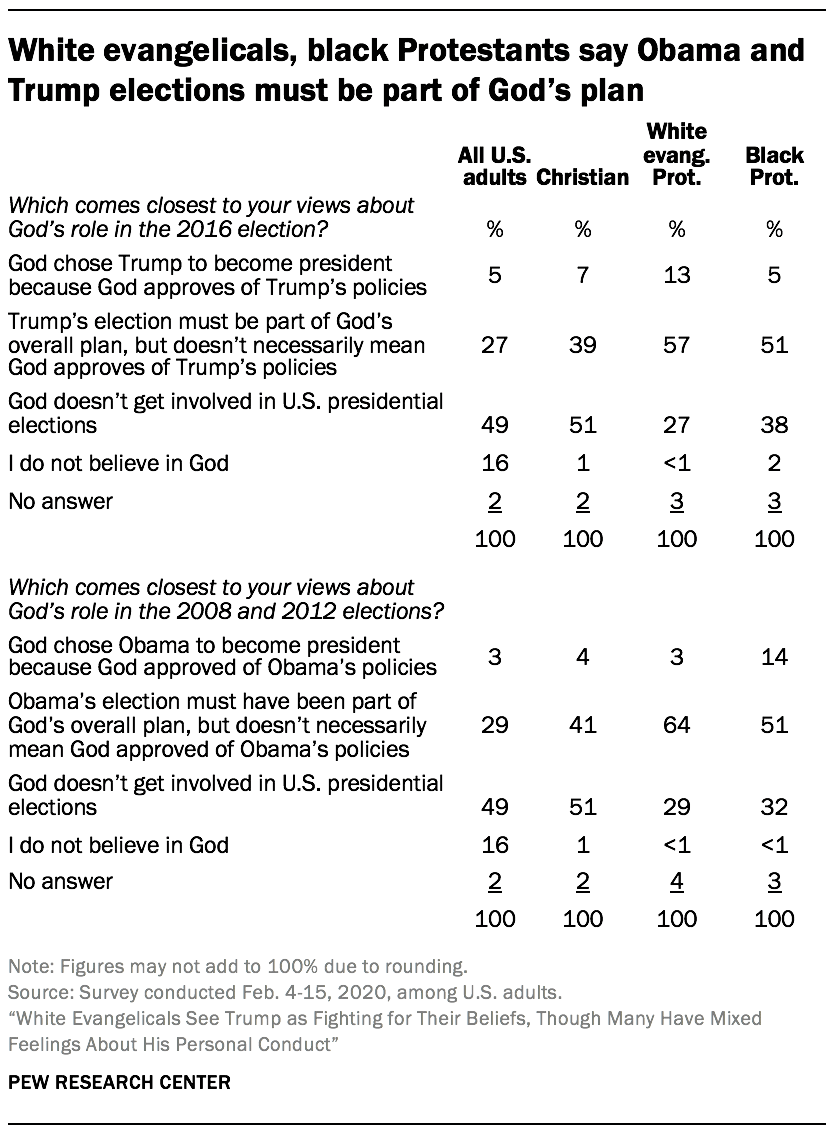
Overall, just 5% of U.S. adults believe God chose Trump to become president because God approves of Trump’s policies. An additional 27% say Trump’s victory in the 2016 election must be part of God’s overall plan, but it does not necessarily mean that God favors Trump’s policies. The remaining two-thirds of Americans either say that God does not get involved in U.S. presidential elections (49%) or that they do not believe in God (16%).
Public opinion about God’s role in the 2008 and 2012 elections is very similar. Only 3% of U.S. adults say God chose Obama to be president in 2008 and 2012 because God approved of his policies, 29% say Obama’s election was part of God’s broader plan but not necessarily an indication that God endorsed Obama’s policies, and the remainder say either that God does not get involved in elections (49%) or that they do not believe in a deity (16%).
White evangelical Protestants and black Protestants tend to think the outcomes of recent presidential elections reflect God’s will in some way, mainly in the sense that the elections of Trump and Obama must be part of God’s overall plan. White evangelicals are somewhat more likely than others to say that God picked Trump due to his policies (13%), while a similar share of black Protestants say the same about Obama (14%), but these are minority views in both groups.
Republicans more likely than Democrats to want a religious president
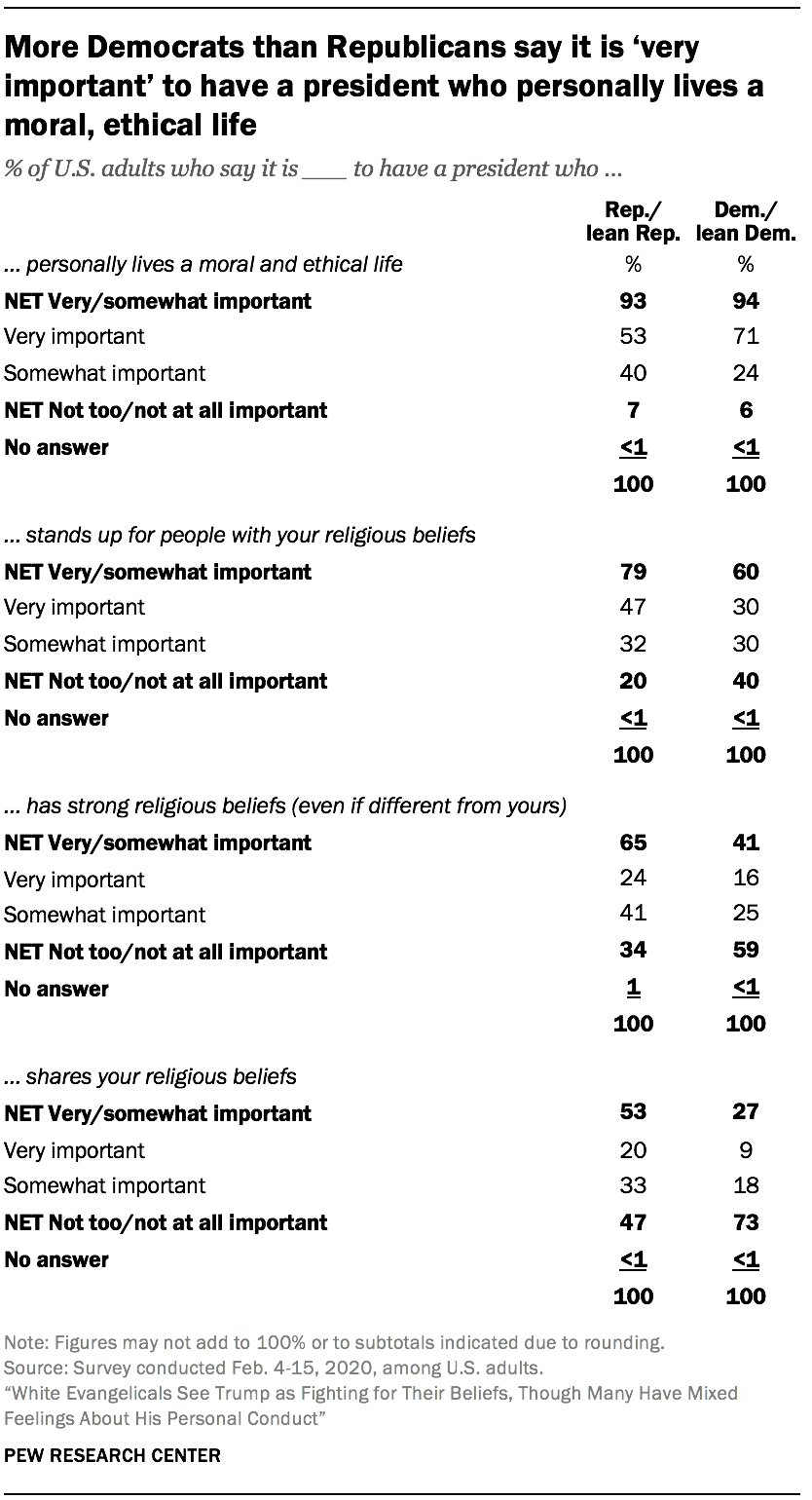
Overall, upward of nine-in-ten Republicans and Democrats agree that it is at least somewhat important to have a president who personally lives a moral and ethical life, though Democrats and those who lean toward the Democratic Party are more likely than Republicans and Republican leaners to say that this is “very important” (71% vs. 53%).
Most people in both parties also say they want a president who stands up for their religious beliefs; on this question, Republicans are more likely than Democrats to say this is “very important” (47% vs. 30%).
Having a president who is deeply religious or who shares one’s own religious beliefs is less important to both Republicans and Democrats, but Republicans place a higher premium than Democrats on both of these qualities. This dovetails with the fact that most religious “nones” are Democrats, and that this group has been growing more quickly in the Democratic Party than in the GOP.
Fewer than half of Americans describe Trump’s religion as Christian
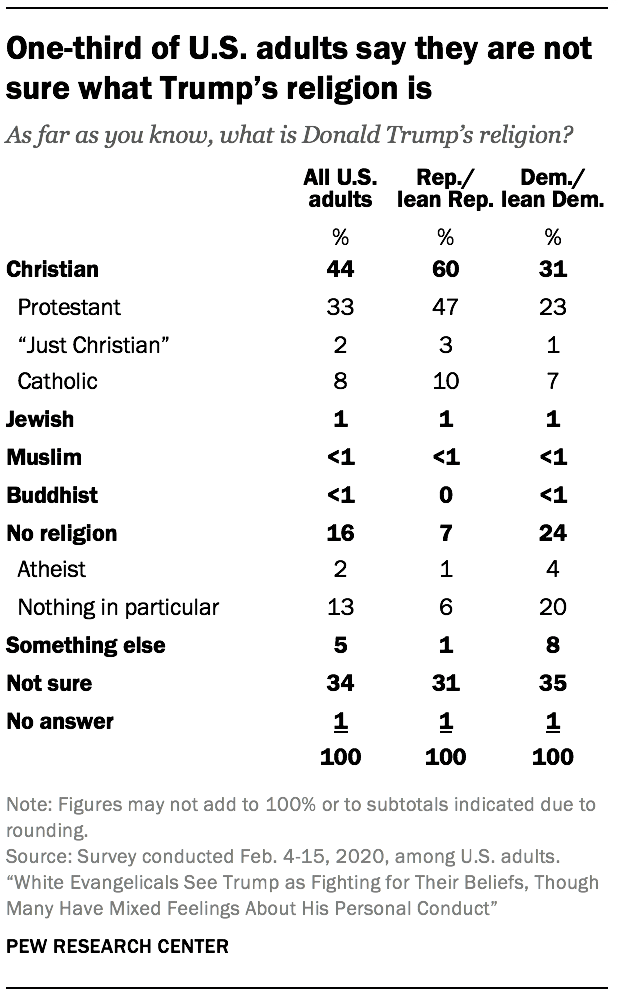
President Trump identifies as Presbyterian, but most Americans do not associate him with Christianity or Protestantism. When asked what Donald Trump’s religion is, about a third say they think Trump is Protestant and 8% say they think he is Catholic.
One-third of U.S. adults (34%) say they aren’t sure what Trump’s religion is, and an additional 16% say Trump has no religion (that he is atheist or that his religion is “nothing in particular”). Much smaller shares say he is Jewish, Muslim or Buddhist. And one-in-twenty Americans (5%) say Trump has some other religion; when asked to specify what they mean, many people in this latter group provide caustic responses, saying they think Trump worships himself, that he worships money or power, that he is a fake Christian or someone who only pretends to be religious, or that he is evil.
Republicans and those who lean toward the GOP are twice as likely as Democrats and their leaners to say Trump is Protestant (47% vs. 23%). Democrats are more likely to think Trump does not have a religion, with one-quarter saying Trump has no religion (including 4% who say he is an atheist and one-in-five who say his religion is “nothing in particular”), compared with 7% of Republicans who say this.
Overall, more than six-in-ten Americans (63%) say Trump is either “not too” or “not at all” religious. But Americans think differently about the vice president. About seven-in-ten say Mike Pence is very or somewhat religious, while just 18% say he is not too, or not at all, religious.
Republicans and Democrats have divergent opinions about Trump’s religiousness: 62% of Republicans think Trump is at least somewhat religious, compared with 12% of Democrats who share that assessment. But the partisan gap in opinion about Pence is not as stark. Majorities in both parties say Pence is at least somewhat religious, although Republicans are more likely than Democrats to say this (81% vs. 67%).
On balance, Americans say Trump administration has helped evangelicals, hurt Muslims
The survey asked whether the Trump administration has helped, hurt or not made much of a difference to the interests of five groups: evangelical Christians, Jews, Catholics, Muslims and people who are not religious. Fewer than half of U.S. adults think the Trump administration has helped any of these groups. But more say the Trump administration has helped evangelical Christians than say it has helped any of the other groups asked about in the survey (43%). And nearly half of U.S. adults say the Trump administration has hurt Muslims. Indeed, U.S. adults are seven times more likely to say the administration has hurt Muslims than to say it has helped this group (48% vs. 7%).
Americans are somewhat divided on the Trump administration’s impact on Jews, with 29% saying Trump has helped Jews, 26% saying he has hurt this group, and 42% saying he has made no difference. Jews themselves also are divided on this question: 40% of U.S. Jews say the administration has helped their interests and 36% say it has hurt them, with fewer saying it has not made much difference (23%). A majority of white evangelical Protestants (57%), meanwhile, say the administration has helped Jewish interests. See Chapter 1 for full details.
